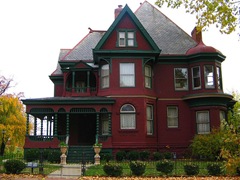There was a (for me) thought provoking article in The New York Times the other day on Weighing the Value of Home Security System.
Our house had an alarm when we moved into it 11 years ago. It was not particularly useful. With children too young for school, there was somebody in the house almost 24/7 so the alarm almost never got turned on. After a while it broke, I never bothered to get it fixed, and eventually I just cancelled the contract. All that is left now are some unobtrusive but ugly motion detectors in the corners of some rooms.
in the house almost 24/7 so the alarm almost never got turned on. After a while it broke, I never bothered to get it fixed, and eventually I just cancelled the contract. All that is left now are some unobtrusive but ugly motion detectors in the corners of some rooms.
Home alarms are more about psychology than economics. That much is clear from the overwrought TV commercials the alarm companies run. They do not mention the discount you will get on your insurance or the average reduction in property loss. Instead we get unlikely dramas with burglars in ski masks and foiled home invasions.
Read more »
Once, in a now faintly remembered time, we were obsessed with house prices. Even as recently as a year ago, such obscure arcana as the Case-Shiller Home Price Index was closely followed. Looking back it is hard to understand why. It was almost as if we thought that houses were a significant slice of our national wealth, that a change in their value might actually effect consumer sentiment and spending, and that a sharp drop in house prices, of all things, had set off the Great Recession. As if.
understand why. It was almost as if we thought that houses were a significant slice of our national wealth, that a change in their value might actually effect consumer sentiment and spending, and that a sharp drop in house prices, of all things, had set off the Great Recession. As if.
Of course, now we know that the Great Recession was started by a mid-level employee in the London office of Goldman Sachs.
Yesterday S&P released the monthly Case-Shiller numbers for February. It did not get a lot of coverage. True, that may be partially attributed to sharing a business news cycle with surprisingly strong consumer sentiment numbers, a turn for the worse in the Greek Crisis, and the ritual sacrifice of Goldman execs to appease the mid-term election gods. But it is hard to escape the conclusion that we have simply lost interest in house prices.
Read more »
Continuing in the spirit of the tax season, this week saw at least two blogs, Weakonomics and Wallet Pop, asking if allowing taxpayers to deduct  mortgage interest is really, after all, a good idea. Both wasted little time before concluding of course not.
mortgage interest is really, after all, a good idea. Both wasted little time before concluding of course not.
In as much as this policy has any sincere defenders, the argument in favor is that it encourages home ownership. But why home ownership, of all things, is a worthwhile goal is generally left unexplored. I suppose a person might imagine some sort of Jeffersonian argument about how a nation of property owners makes for a more stable democracy. Alas, our leaders in Washington are rarely so philosophical.
When a politician says that he favors mortgage deductibility because it encourages home ownership it is a wink and/or nod in the direction of those who already own homes. It is an important bit of government largess for these voters because they get a nice tax break and, possibly more significantly, anybody they sell their house to will also get a nice tax break.
Read more »
I have just discovered that Consumer Reports, the go-to place for the lowdown on vacuum cleaner reliability, also gives personal finance advice. Who knew? Today I stumbled across their Money Blog, which carries a post on how  you should pay off your mortgage before you retire. It is enough to make me worry about their vacuum cleaner wisdom.
you should pay off your mortgage before you retire. It is enough to make me worry about their vacuum cleaner wisdom.
Permit me to quote the first two paragraphs:
Back when the stock market seemed to go in only one direction—up— you could make a decent case for keeping a mortgage as long as possible. Why rush to pay off a debt at, say, 6 percent, when the same money, invested in the stock market, was all but guaranteed to return 10 percent?
That kind of thinking may help explain this startling finding in a just-released Society of Actuaries report: Only 48 percent of retirees surveyed in 2009 had completely paid off their mortgages, compared with 76 percent in the group’s 2007 study.
Read more »
It’s S&P Case-Shiller day again. This month’s update of the house price indexes, which are for January 2010, continue the recent trend of being slightly down in absolute terms, –0.4% for the 20-city composite, but slightly up when seasonally adjusted, +0.3%.
slightly down in absolute terms, –0.4% for the 20-city composite, but slightly up when seasonally adjusted, +0.3%.
I would characterize the numbers as being delightfully dull. Obviously, a sharp upswing in house prices would be better for homeowners, particularly the ones under water, but flat is a tremendous improvement over the death spiral that ran from the summer of ‘06 to the summer of ‘09. On a year-on-year basis the 20-city was down only –0.7% to January ‘10. With luck, that number will soon turn positive, something that has not happened since January ‘07.
With not much to report from the indexes, I thought I would take advantage of S&P C-S Day to mention two other house related things that have been bothering me lately.
Read more »
 in the house almost 24/7 so the alarm almost never got turned on. After a while it broke, I never bothered to get it fixed, and eventually I just cancelled the contract. All that is left now are some unobtrusive but ugly motion detectors in the corners of some rooms.
in the house almost 24/7 so the alarm almost never got turned on. After a while it broke, I never bothered to get it fixed, and eventually I just cancelled the contract. All that is left now are some unobtrusive but ugly motion detectors in the corners of some rooms.

 you should pay off your mortgage
you should pay off your mortgage